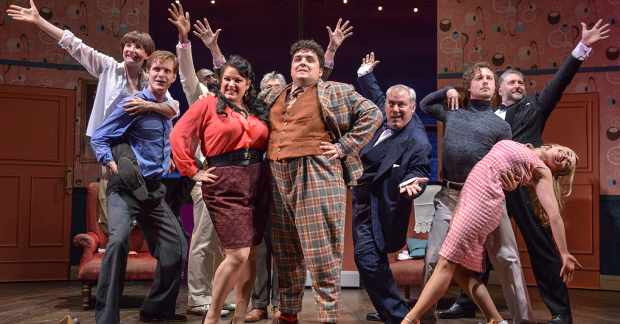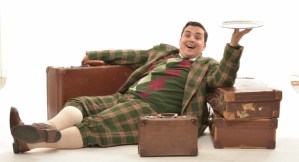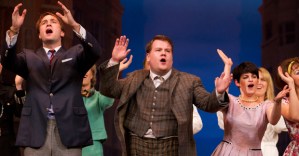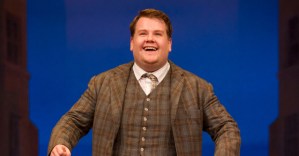Review: One Man, Two Guvnors (Derby Theatre)
Richard Bean’s award-winning production, originally starring James Corden, will move to Queen’s Theatre Hornchurch next month

© Robert Day
Carlo Goldoni believed that any adaptation of his mid-18th century farce, The Servant of Two Masters, should be bold and original enough to reflect the society it was being performed for – certainly a sensible view for a play that always contained improvisatory elements and therefore never had a completely fixed form.
Over the last 20 years, British theatre has taken Goldoni at his word with at least three new versions, two of which have transferred 18th century Venice to the 19th century Yorkshire and, in the case of One Man, Two Guvnors, to Brighton in 1953. Richard Bean's play originally premiered at the National Theatre in 2011 and has since won several international awards. In Sarah Brigham's inventive and exuberant production for Derby Theatre, it's easy to see why.
The plot – in Bean's version no less than in Goldoni's original – is almost wilfully confused, but the free-wheeling style of Brigham's production makes it easy to go with the flow. At the heart of it is Francis Henshall – "a lovable idiot" according to Bean, unable to resist the temptation to take on two jobs
as a servant. Complications come from the fact that neither of the employers must know about the other, one is a woman in disguise seeking her lover who has killed her brother and that the lover is Henshall's other boss.
One of Bean's many inspirations is to replace the noble duel of Goldoni's play with a gangland killing. Charlie "The Duck" Clench is celebrating the engagement of his daughter Pauline to vapid would-be actor Alan Dangle when Henshall brings the news that Roscoe Crabbe – engaged to Pauline in a marriage of convenience – is not dead after all and is outside ready to claim a promised pay-out. Crabbe is actually, in fact, his twin sister Rachel ("identical" as Charlie repeatedly insists) and soon Francis is employed both by Rachel/ Roscoe and her lover/ his assassin Stanley Stubbers (Bean's way with surnames is unfailingly inspired).
There is a time in act two when there seems to be a bit too much plot to go around, but generally it's safe to sit back and enjoy Francis delivering messages to the wrong master or frantically serving two meals at once while trying to get most of the food for himself.
David O'Reilly is outstanding in the central role, setting the tone for the production with outrageous voices, off-beat asides, perfectly-timed physical comedy and knowing complicity with the audience. The uniformly excellent cast of eleven is pitched at different levels of absurdity, from David Cardy offering a semi-realistic narrative base as Charlie Clench to TJ Holmes echoing Mr Pastry as the aged waiter Alfie, his life a series of pratfalls.
Samantha Hull's charmingly ignorant Pauline is matched by Jack Brett's self-dramatising Alan, who sees himself as a Shakespearean hero but doesn't have the words – a performance of attitudes vainly struck. Stanley George Kemp offers a different type of idiot – the upper-class public-school twit – and Alice Frankham's parody of a gang boss is unerring, which makes her passionate resumption of femininity all the more amusing.
The Rozzers Skiffle Band delivers Grant Olding's period songs with panache, bobbing up between scenes to do a front-curtain number, sometimes backing a cast member's solo turn. All great fun, even if the mini-sets (three of four numbers) before each act seem to stretch a fairly long evening.
The stage extended over the pit gives a suitably intimate music hall/ end-of-the-pier feel to the show, with Neil Irish's visually attractive and highly practical sets containing enough stairs to fall down and doors to knock people flying. Like all the best farce, this is a very slick production that somehow pretends
otherwise.



















